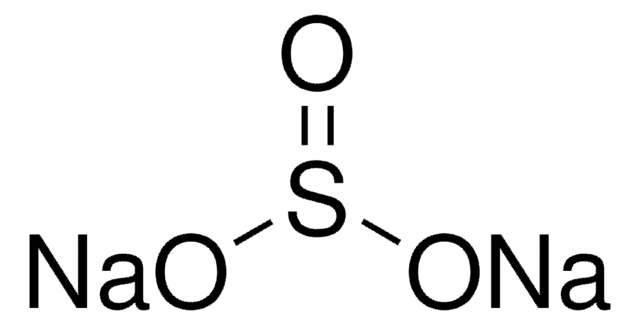746363
Sodium sulfate
anhydrous, free-flowing, Redi-Dri™, ACS reagent, ≥99%
About This Item
anhydrous
Recommended Products
grade
ACS reagent
anhydrous
Quality Level
Agency
suitable for EPA 1613
product line
Redi-Dri™
Assay
≥99%
form
powder
quality
free-flowing
impurities
≤0.01% insolubles
≤5 ppm N compounds
loss
≤0.5% loss on ignition
pH
5.2-9.2 (25 °C, 5%)
mp
884 °C (lit.)
density
2.68 g/mL at 25 °C (lit.)
anion traces
chloride (Cl-): ≤0.001%
phosphate (PO43-): ≤0.001%
cation traces
Ca: ≤0.002%
Fe: ≤0.001%
K: ≤0.002%
Mg: ≤0.001%
heavy metals: ≤5 ppm (by ICP-OES)
SMILES string
[Na+].[Na+].[O-]S([O-])(=O)=O
InChI
1S/2Na.H2O4S/c;;1-5(2,3)4/h;;(H2,1,2,3,4)/q2*+1;/p-2
InChI key
PMZURENOXWZQFD-UHFFFAOYSA-L
Looking for similar products? Visit Product Comparison Guide
Application
Features and Benefits
- Increased efficiency – Eliminates time and effort of loosening hardened powders
- Safety – Eliminates tools of force used to break up clumps
- Ecology – Reduces waste as it does not stick to the packaging
- Economy – Faster preparation and solvation increase productivity and reduce costs
- Assured quality – Excellent, expert-tested quality with no anti-caking agents
- Flexible volumes – Available from research amounts to scale-up quantities
Legal Information
Storage Class Code
13 - Non Combustible Solids
WGK
WGK 1
Flash Point(F)
Not applicable
Flash Point(C)
Not applicable
Choose from one of the most recent versions:
Already Own This Product?
Find documentation for the products that you have recently purchased in the Document Library.
Customers Also Viewed
Articles
Redi-Dri™ prevents hygroscopic powders, such as inorganic salts, from absorbing moisture and forming clumps, leaving the salts free-flowing every time.
Our team of scientists has experience in all areas of research including Life Science, Material Science, Chemical Synthesis, Chromatography, Analytical and many others.
Contact Technical Service





